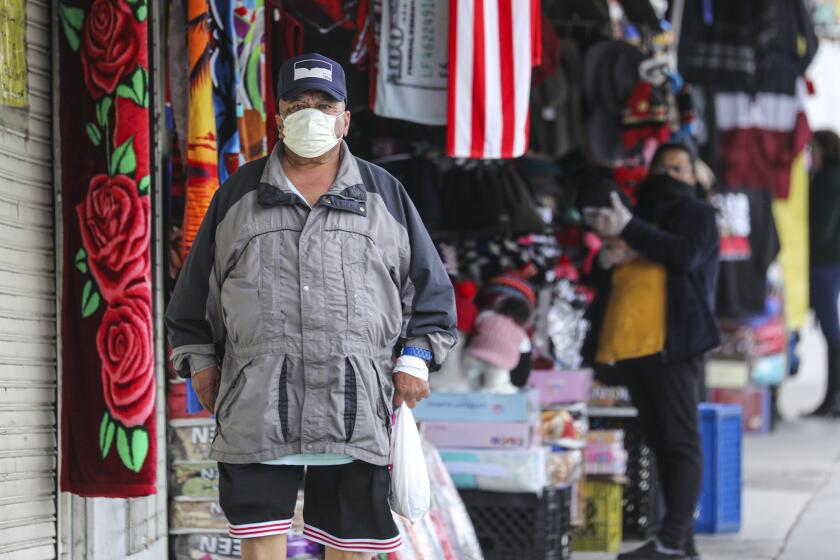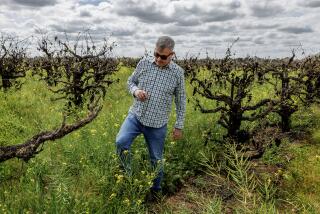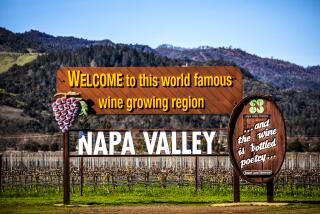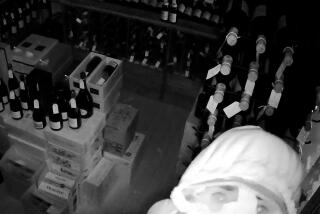California wineries reel after closing tasting rooms due to coronavirus
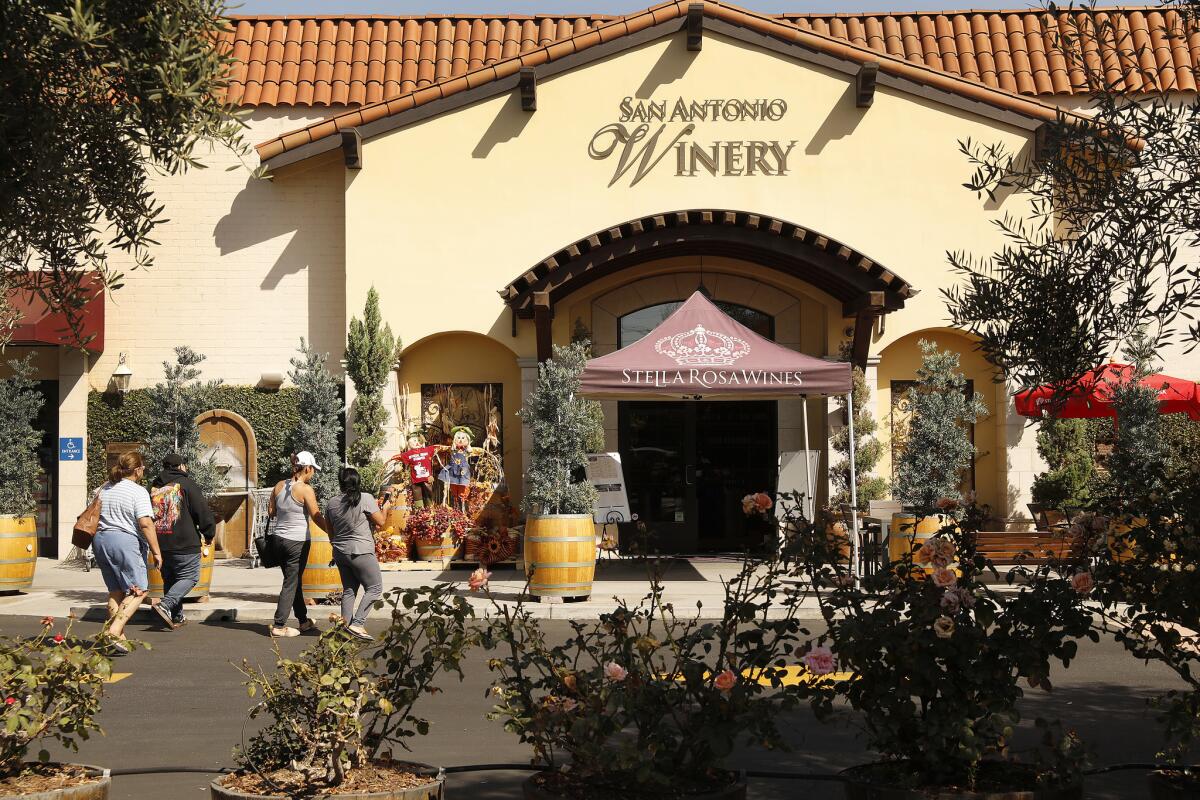
For the last six years, Jamie Slone and his wife Kym have run a boutique Santa Barbara winery that sells about 1,200 cases of Cabernet Sauvignon, Pinot Noir and other varieties each year.
The operation, called Jamie Slone Wines, relies heavily on its downtown Santa Barbara tasting room, which accounts for 95% of the business’ annual revenue. But on Monday, a day after Gov. Gavin Newsom advised bars and wineries to shutter amid the coronavirus outbreak, a rattled Slone closed his tasting room.
“It doesn’t take long to do the math to see how this can be devastating,” he said.
Amid the widening pandemic, Newsom’ directive, which was announced at a Sunday press conference, stopped short of a mandate. But it seemed to have the effect of one.
Across the state, wineries heeded Newsom’s advisory, shuttering their tasting rooms and canceling tours on Monday.
Although production will continue — at this time of year, vines are pruned and some wines are bottled — the effects of the advisory will be a blow to the economy in California, which produces more wine than any other state.
Wine grape growing, wine production and wine-related tourism in California contribute $57.6 billion to the state’s economy and $114.1 billion to the U.S. economy, according to a 2015 report by the Wine Institute, an advocacy group representing more than 1,000 California wineries. The state’s wine business directly and indirectly generates 325,000 jobs in California and 786,000 across the nation.
Most winemakers or winery owners interviewed by The Times said they supported closing tasting rooms and stopping tours. Some noted, with optimism, that they are still able to sell bottled wine on site, and continue winemaking operations.
“None of us knows how long this is going to last; I think it’s a prudent thing to do,” said Ross Jay Rankin, head of the Santa Ynez Wine Country Assn. and owner, with wife Lyn Dee, of the winery Imagine Wine. “It’s a complicated situation but it’s not as bad as it seems because they’re not making us shut down production.”
The owners of smaller wineries The Times spoke with expressed more serious concern over the closures. Such operators said they rely heavily on revenue generated by tasting rooms, where patrons typically try wines for a fee and make retail purchases.
Rankin’s 18-year-old winery produces about 1,000 cases of Syrah and other wines a year. Customers can try and buy at his six-seat tasting room in Buellton, Calif. He said that there has already been a drop-off in business over the last month due to coronavirus concerns, prompting him to reach out to wine club members with a plea.
“We sent a message to our customers that said, ‘Help, we need business,’” Rankin said. “We had a stunning response.” Customers who typically bought bottles of his wines, which range in price from a $28 Zinfandel to a $60 Syrah, bought cases of it instead.
Get the latest coronavirus updates from our staff in California and around the world.
Slone, who termed his winery a “micro-boutique,” acknowledged he is in a particularly tough spot because his wine is only sold directly to consumers and not at, for example, wine shops. The company’s tasting room, he said, “Is how we meet people and have them become wine club members.”
Amid the shutdown, Slone is counting on bottle sales at his tasting room, as well as online purchases and his wine club, to keep the business afloat. And he is willing to take extraordinary steps to get his wine in customers’ hands.
“I’m personally offering to hand-deliver our wine myself, if they live anywhere between Camarillo to Goleta,” he said.
Bigger producers said they do not expect the closure of their tasting rooms to affect their overall revenue outlook in a commensurate way.
Napa-based Delicato Family Wines operates four wineries and multiple brands that sell about 13 million cases of wine annually. While tours and tastings at the Delicato wineries Black Stallion Estate in Napa and Delicato Family Wines in Manteca, Calif., have stopped, co-owner Chris Indelicato said that such business accounts for less than 1% of his company’s overall annual revenue.
“If I had to predict, wine club sales will go up dramatically,” said Indelicato.
He said that years ago, Delicato — a fourth-generation, family-owned operation — was once a fraction of its current size, so he knows what it’s like to be a smaller operator and is concerned for such businesses.
“I feel very bad for those wineries for whom a big piece of their business is interacting in the tasting rooms,” he said. “My hope is that this [resolves] quickly so that people can get their sales back.”
Despite Newsom’s directive, some tasting rooms remained open Monday.
Chris Kenefick, co-owner of Kenefick Ranch Vineyard & Winery in Calistoga, said that a nearby tasting room at Fairwinds Estate Winery, where his wines are poured alongside other brands, was still open on Monday. But foot traffic has been so light, he said, that it may close soon.
Kenefick said the pandemic has put a damper on his company’s wholesale business, which accounts for about 80% of its sales. He said that two out-of-state events have recently been canceled or postponed.
“Where we are going to see the biggest impact is across the country,” said Kenefick. “We are hoping that people in their homes are going to directly order from us.”
One notable winery was still offering tastings on site: Napa Valley’s Alpha Omega Winery, which counts Rep. Devin Nunes (R-Tulare) as an investor.
During a Sunday appearance on the Fox News program “Sunday Morning Futures,” Nunes said healthy people should continue to visit restaurants and their “local pub.” Hours later, Newsom made the call for bars and wineries to shutter. But the tasting room at Alpha Omega was still open Monday, a representative of the winery said. Walk-in tastings start at $50.
Asked whether the decision to continue offering tastings was tied to Nunes’ public statements a day earlier, a spokeswoman for Alpha Omega declined to comment.
Nunes isn’t the only politician with California wine industry interests. Newsom is the co-founder of PlumpJack Group, a hospitality management company whose holdings include four Northern California wineries. A representative of one of those operations said all four closed their tasting rooms Monday.
In Los Angeles, the family behind San Antonio Winery, which has operated since 1917 near downtown, decided to call off tastings and tours. But Steve Riboli, a co-owner, said they are selling wines at half-price at the winery as a way to “say thank you.”
“We are giving some sanity to Angelenos … because this is an insane time,” he said. “It’s the Riboli family’s way of saying: We know we are in this together, as a country and as a city, specifically.”
Times staff writers Phil Willon and Adam Elmahrek contributed to this report.
More to Read
Eat your way across L.A.
Get our weekly Tasting Notes newsletter for reviews, news and more.
You may occasionally receive promotional content from the Los Angeles Times.
